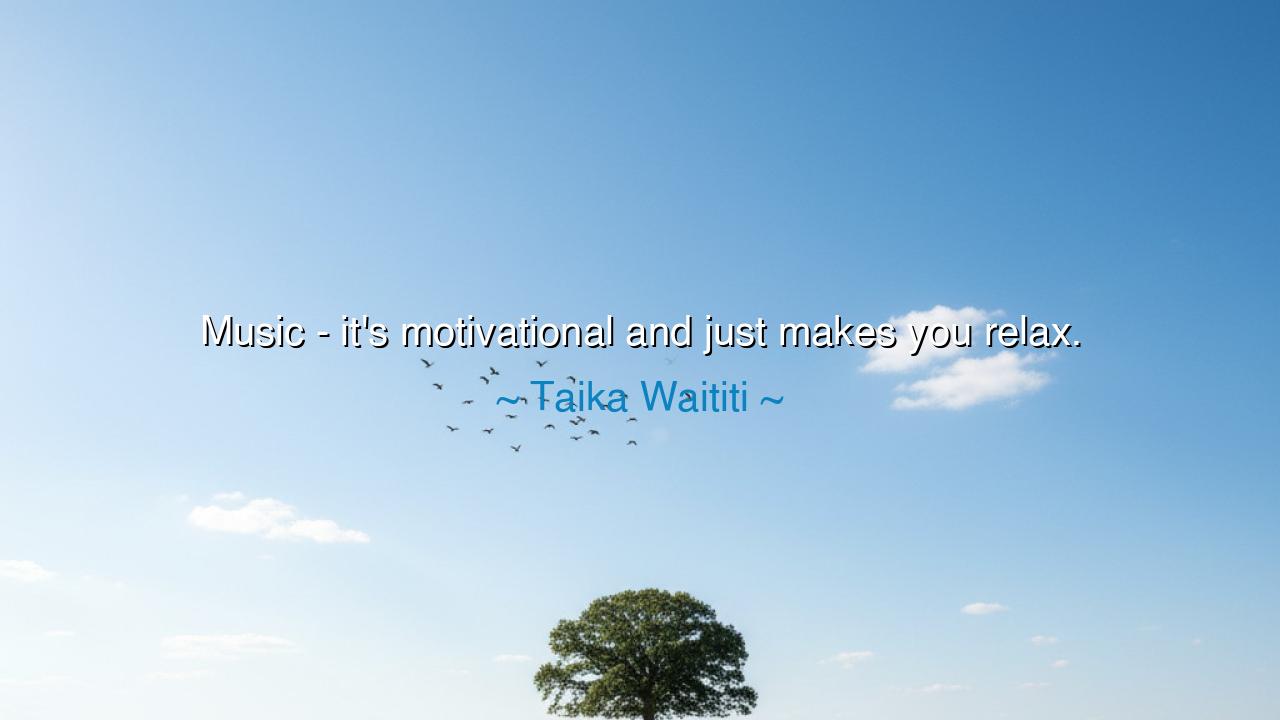
Music - it's motivational and just makes you relax.






Hear the words of Taika Waititi, creator of stories and shaper of visions: “Music – it’s motivational and just makes you relax.” Simple though they appear, these words carry the weight of a truth as ancient as humanity itself. For long before men carved their histories in stone, they carved their emotions into song. Music is the eternal companion of the human soul—it stirs us to courage, it soothes us in sorrow, it grants rhythm to our labors and rest to our weary minds. In this brief saying, Waititi reminds us that music is both sword and balm: it drives us forward, yet also lays us gently down.
At the heart of his reflection is the paradox of motivation and relaxation. Music is not bound to one single function; it adapts itself to the need of the moment. A march fills soldiers with strength as they prepare for battle, while a lullaby quiets the restless heart of a child. In the same way, a creator like Waititi draws upon music for both fire and calm—for the energy to begin his work, and the peace to return from its storms. This dual nature is what makes music sacred: it can awaken the warrior and console the dreamer.
The ancients knew this power well. Plato spoke of the modes of Greek music, some of which could embolden courage, others soften the spirit, and still others corrupt the soul if misused. The Spartans trained to flutes and chants, marching into battle in perfect rhythm, their courage magnified by sound. Yet in temples and homes, music was the language of prayer, healing, and rest. Thus from the beginning, music has been both stimulant and sanctuary, a force to shape not only emotion but destiny itself.
Consider also the story of Winston Churchill during the dark days of World War II. When London burned under the bombs of the Blitz, it was not only speeches that held the people together—it was song. Communities gathered in shelters and sang familiar tunes, drawing strength and hope from their shared voices. In such moments, music was not mere entertainment; it was a lifeline. It gave them motivation to endure, yet also relaxation from the terror above. In this way, history affirms Waititi’s words: music carries us through both battle and rest.
What is remarkable in his statement is its humility. He does not seek to dress music in lofty words of theory, nor does he claim to master its mysteries. Instead, he speaks as one who has felt its power directly. For sometimes wisdom is not in complicated explanations, but in the recognition of simple truths. Music is both fire and water, both movement and stillness, both challenge and comfort. To live without it is to deny the soul its most ancient medicine.
The deeper meaning of his words is this: that life requires both striving and surrender. We must be driven, yes, but we must also know how to rest. Music teaches us both. It awakens our ambition when our spirit grows dull, and it soothes our exhaustion when our striving grows too great. It teaches us the rhythm of existence: tension and release, action and peace, rising and falling like the beating of a drum.
What lesson, then, must we take? It is this: do not treat music as background noise, but as a tool of the soul. Use it intentionally. When you need to rise, find the songs that stir your courage. When you need to rest, choose the melodies that calm your heart. Recognize in music a gift that transcends language, culture, and time—a gift that can shape your mood, your energy, even your destiny.
Thus let it be remembered: music is the twin force of motivation and relaxation, the fire that drives us and the water that cools us. In its rhythms we find the secret of balance, in its melodies the wisdom of peace, and in its crescendos the courage to rise again. May you, like Taika Waititi, hold music close—not only to inspire your work, but to soothe your spirit, guiding you always toward harmony in the dance of life.






AAdministratorAdministrator
Welcome, honored guests. Please leave a comment, we will respond soon